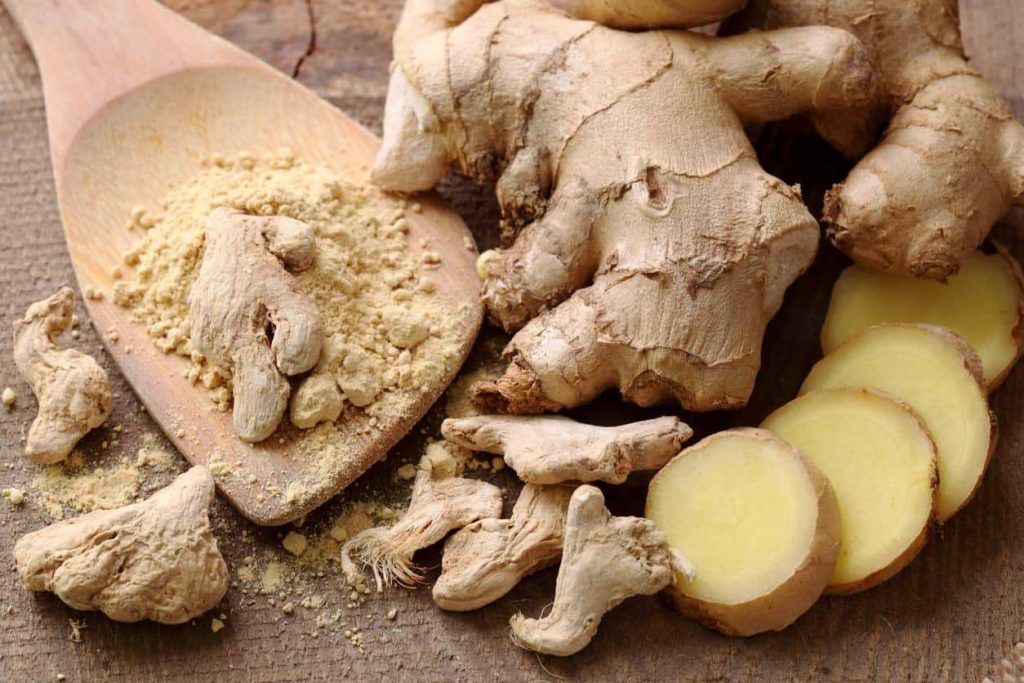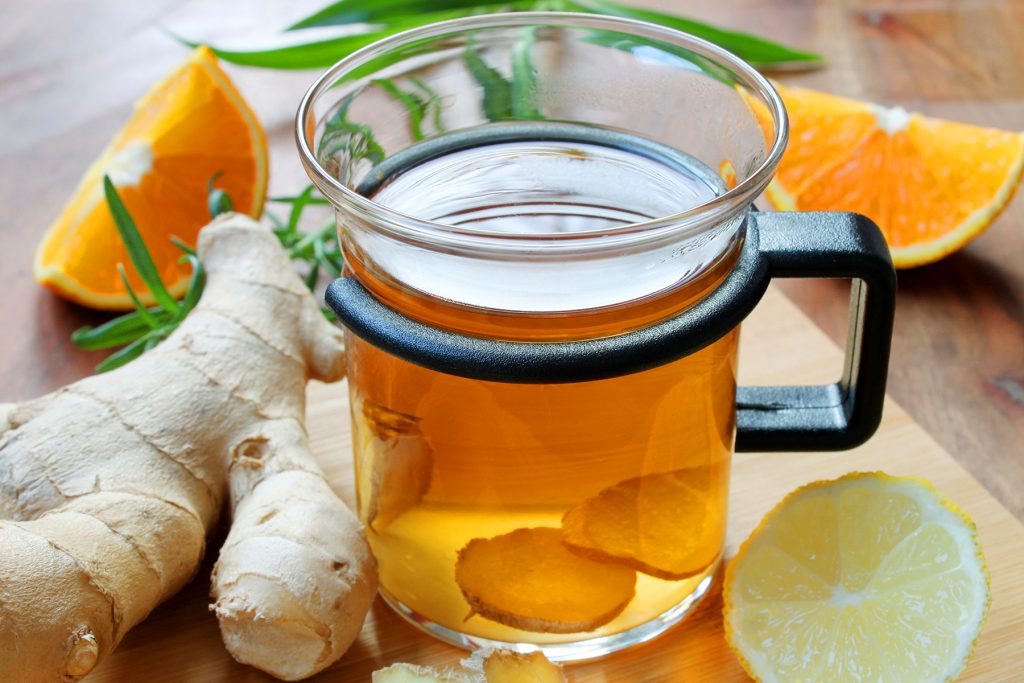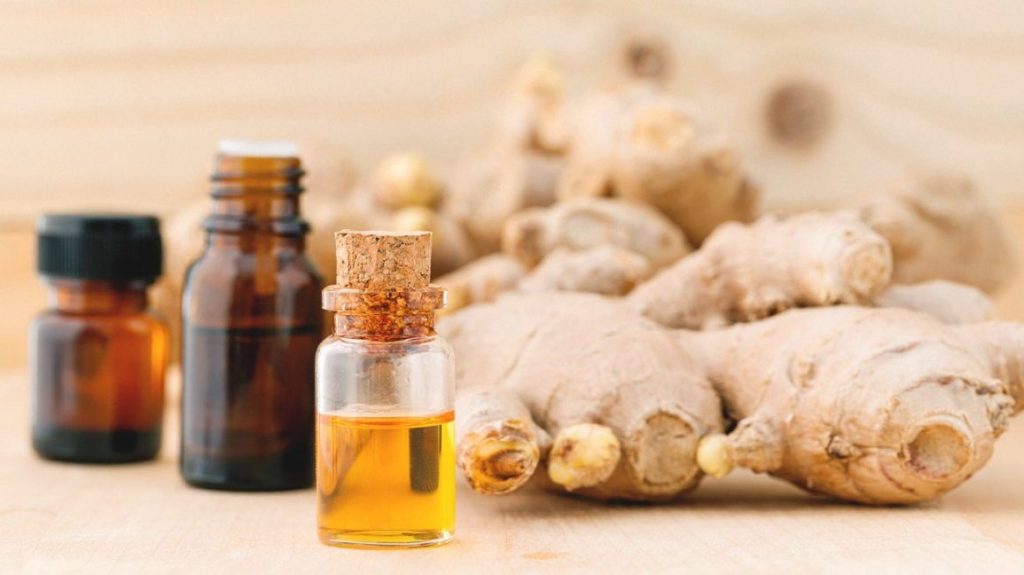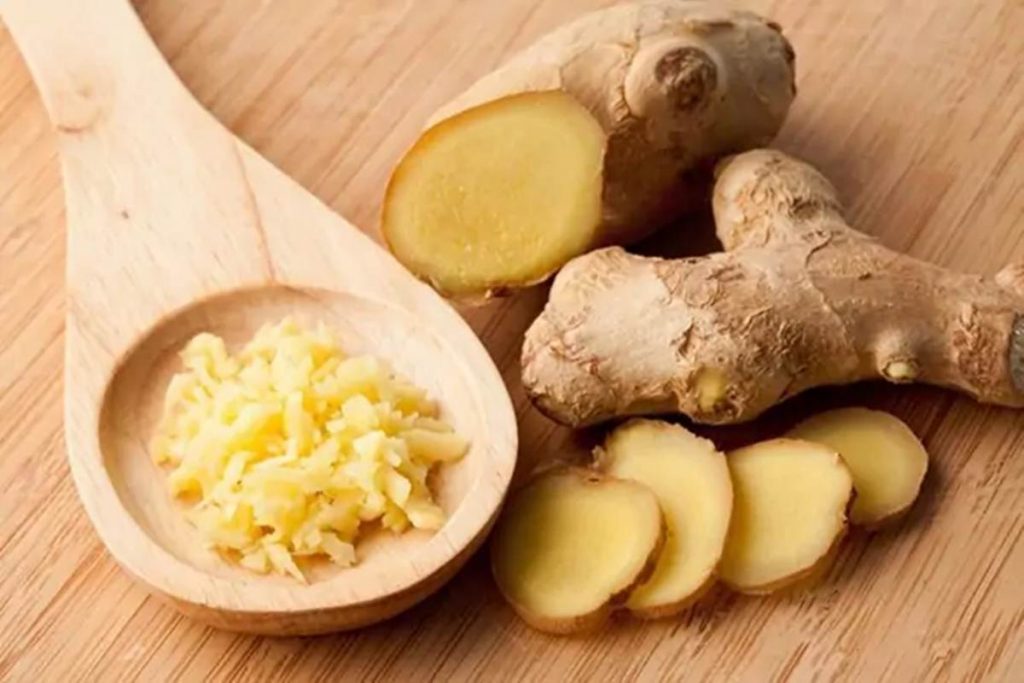A Brief History Of Ginger- The Benefits Of Adding GingerIn Your Diet – Nutritional Benefits of Ginger- Ginger Effects – Are There Any?
Every household has its own take on what to and not to buy when in the grocery. However, one thing is for sure: you will always find ginger in the grocery cart.
There are several reasons why. Adding ginger in your dishes could give it a distinct flavor and aroma. It is also an effective home remedy for sore throat and cough among others.
Did you know that there is more to ginger than just your usual cough remedy?
Keep reading to know more about one of the world’s healthiest foods including nutritional component, side effects, if any, storage tips, and different ways on how to use it.
Ginger, In A Nutshell
Ginger is a staple ingredient in many Asian countries. It is often mixed with meat, seafood, and even vegetable dishes.
What’s so special about ginger?
Scientifically known as Zingiber officiale, this bumpy root belongs to the same Zingiberaceae family as cardamom and turmeric. This underground rhizome has light brown skin and yellow, white, or red flesh.
As to the taste, ginger is sweet and slightly peppery. Its taste slowly mellows once cooked and could turn bitter if burned. Also, it has a pungent and spicy aroma, which you can eventually get used to once cooked.
Ginger plant originated from Southeast Asia, which explains why this is a staple in many Asian countries. Because of the spice trade, ginger was slowly introduced to the West.
Here’s the surprising part: ginger root comes in varieties, depending on your preferred usage. These are:
- Fresh – There are two types: young and mature. Young ginger has pale, thin skin, is tender, and has milder flavor. On the other hand, mature ginger has tough skin and requires peeling to be able to enjoy its many health benefits.
- Ground – This is the powdered version and readily available in supermarkets. This variety is recommended for sweets and curry dishes. Unfortunately, the flavor is not as strong compared to the fresh variant.
- Dried – This is similar to human hands with whole fingers or in slices. Before cooking, make sure to soak first in the recipe’s liquid before using.
- Pickled – This is called gari or beni shoga in Japan. It is often pink or bright red in color and pickled in sweet vinegar.
- Preserved – This variant is preserved in sugar and salt mixture. It is best used as a confection or added to your favorite dessert. Preserved ginger is available in Asian markets as well as in specialty markets.
- Candied – This ginger variant is cooked in sugar syrup until tender. Then, it will be coated in granulated sugar. This variant is ideal for desserts.

The good news is ginger is readily available in the market. For fresh ginger, you can check out the produce section in supermarkets. Go for ginger with smooth skin, spicy fragrance, and has no molds.
The spice section in the grocery store could also carry ground ginger. This could be an alternative in case you ran out of fresh.
Ginger History
Ginger has been around for centuries. What exactly is the story behind it?
It turns out that ginger is a native in Southeast Asia. Because of trade with nearby civilizations, ginger spread to India, China, and Middle East countries. Ginger was eventually considered as a prized culinary ingredient because of its culinary, medicinal, and aromatic properties.
Later on or two thousand years ago, ginger was brought to Europe when ancient Romans imported it from China. Since then, ginger became popular in Europe, specifically in the Mediterranean region, despite the expensive price tag,
To make ginger more available, Spanish explorers brought ginger to Mexico, West Indies, and South America. By the 16th century, these places started to export ginger back in Europe.
Ginger prices were also expensive back then. During those times, ginger cost has the same amount of live sheep or a piece of livestock.
Believe it or not, ginger was traded longer than other ingredients throughout the history. It became popular for its many medicinal benefits.
Fast forward today, ginger is among the staple food ingredients at home.
Ginger Nutrition Facts
Ginger’s nutritional profile is exceptional. A tablespoon or six grams of ginger could already give you the following:
- Protein
- Carbohydrates
- Fat, including monounsaturated and polyunsaturated fats
- Dietary fiber
- Choline
- Niacin
- Folate
- Vitamins C, E, and K
- Calcium
- Copper
- Iron
- Magnesium
- Phosphorus
- Potassium
- Selenium
- Sodium
- Zinc
Consequently, one tablespoon of ginger gives you less than five calories and 4.73 grams water content. It also has small doses of omega-6 fatty acids, linoleic acid, and palmitic acid.
In other words, ginger is loaded with essential vitamins, minerals, and other nutrients to keep you in your best state.
Ginger Benefits
More than being a kitchen favorite, ginger boasts many health benefits. This includes:

Powerful Medicinal Properties
For centuries, ginger was used to treat various diseases and form part of traditional or alternative medicine. The question is why.
It’s all because of gingerol. This is ginger’s main bioactive compound that is responsible for its medicinal properties.
Based on a review posted at Natural Product Communications, gingerol has powerful antioxidant and anti-inflammatory effects. This means ginger has the capacity to protect you against various diseases.
Lowers Risk Of Infection
Ginger is a powerful medicinal plant with many antioxidant and anti-inflammatory effects. More than this, it’s also about gingerol.
Gingerol is a bioactive substance found in fresh ginger. It helps lower the risk of infection by inhibiting the growth of bacteria in the body.
In relation to bacteria, ginger, because of gingerol, could effectively kill oral bacteria that are linked to inflammatory diseases related to gums such as periodontitis and gingivitis.
Helps Ease Flu Symptoms
Flu is a common condition among kids and adults. Surely, for many years, your grandmother gives you fresh ginger tea to help you feel better and recover from cough or colds. In fact, ginger has been a popular home remedy for centuries, thanks to its powerful medicinal properties.
In a recent study, experts examined the anti-viral properties of ginger in combatting flu. It helps protect the respiratory system, particularly if you used fresh ginger.
In a study published in the Journal of Ethnopharmacology, fresh ginger is effective against RSV virus, a type of virus that commonly causes respiratory infections.
Although further studies are needed to determine the exact component why ginger is effective on flu symptoms, it’s hard to deny the fact that it could help ease the discomfort.
Reduce Exercise-Induced Muscle Pain
Exercise is and should always be part of your daily routine. At some point, you might experience soreness or muscle pain as a result of your workout. Although this could go away, ginger could help ease the pain.
A study published in The Journal of Pain explored the effects of ginger on exercise-induced muscle injury. In the said study, two grams of ginger everyday is an effective pain reliever. In fact, you could experience the relieving effects in 24 hours.
Another study also looked into ginger’s effects on muscle pain induced by eccentric exercise. Due to its anti-inflammatory and analgesic properties, ginger could effectively reduce day-to-day progression of muscle pain.
Effective Against Menstrual Pain
Aside from exercise-induced muscle pain, did you know that ginger could also be used against menstrual pain or dysmenorrhea?
Dysmenorrhea is painful menstrual periods caused by uterine contractions. It can be recurring menstrual cramps or caused by a disorder in the reproductive organ such as uterine fibroids or endometriosis. Either way, treatment is available.
Speaking or treatment, taking ginger could help alleviate the pain caused by dysmenorrhea.
Based on a study from Journal of Alternative and Complementary Medicine, ginger could effectively reduce the pain during menstrual periods. Believe it or not, ginger was able to effectively manage menstrual pain similar to how ibuprofen and mefenamic acid drugs work.
The best part is ginger is safer and natural to use.
Helps Against Osteoarthritis
Speaking of anti-inflammatory properties, did you know that ginger is also recommended for osteoarthritis?
Osteoarthritis is the most common form of arthritis. It is characterized as degeneration of joints in the body, particularly in the hands, knees, and hips. This could lead to stiffness, swelling, and joint pain.
According to the CDC, more than 32.5 million Americans have osteoarthritis.
Treatments and medications are available but if you prefer the natural way, then ginger could help address this condition.
According to a study published in Arthritis and Rheumatism, ginger extract could be effective against this condition. 247 people with osteoarthritis of the knee took concentrated ginger extracts everyday for six weeks. At the end of the study, experts noted a significant reduction of osteoarthritis symptoms. Further, they took lesser pain medications during the duration of the study.
It’s not just ginger alone. Based on this study from the Pakistan Journal of Biological Science, the combination of ginger, cinnamon, mastic, and sesame oil is effective against osteoarthritis. When applied topically, it could reduce pain and stiffness, thereby enabling you to move.
Effective Against Nausea
Nausea can be due to many things. It could be because of early months of pregnancy, side effect of a medicine, or a symptom of a medical condition. Although there is no specific medicine for nausea, ginger is often recommended to address this.
According to a study published in the British Journal of Anaesthesia, ginger reduced the incidence of post-operative nausea among patients.
Another more recent study published in the American Journal of Obstetrics and Gynecology revealed the same result. In the said study, hundreds of patients were given one gram of ginger post-operation. Experts noted that those who were given ginger experienced less vomiting and nausea episodes compared to the placebo group.
Did you know that ginger is also effective against pregnancy-related nausea or morning sickness?
Based on a study in Nutrition Journal, ginger is a safe treatment for pregnant women who experienced morning sickness. A dose between 1.1 and 1.5 grams of ginger significantly reduced nausea symptoms.
Still, make sure you inform your doctor regarding your intention to take ginger. Although ginger is generally safe, the possibilities of miscarriage or birth defects have not been studied yet.

Treatment For Chronic Indigestion
Also known as dyspepsia, chronic indigestion comes with recurring pain and discomfort particularly in the upper portion of your stomach. This can be due to many reasons including a delay in emptying of the stomach.
How can you treat this? Medications are available in the market but the ingredients might be a cause of concern.
In this case, ginger could help.
When taken, ginger helps speed up the emptying of the stomach for those with functional dyspepsia. In fact, it will take 12 minutes for the stomach to empty.
One study in the European Journal of Gastroenterology and Hepatology published similar results. In the said study, ginger accelerates gastric emptying of the stomach by 50 percent when you take 1.2 grams of ginger powder before meals.
This will help reduce any form of discomfort.
Lowers Cholesterol Levels
The recommended cholesterol level is 240 mg/DL. Anything above that means you have high cholesterol levels, which is currently affecting more than 12 percent of adults in America.
Unfortunately, it’s hard to tell if you have high cholesterol levels due to lack of symptoms, unless you get a blood test.
Here’s some good news: ginger could help lower your cholesterol levels.
In this 2008 study, experts divided subject participants into two groups – placebo and the group who will receive three grams of ginger capsule per day for 45 days. At the end of the experiment, the ginger group had a significant reduction in their triglyceride, cholesterol, and LDL levels compared to placebo group.
Although this study looks promising, further research and experimentation are needed.
Ginger Side Effects
Given these many health benefits, is it possible for ginger to have side effects?
Generally, ginger is safe for human consumption. In fact, the FDA considers ginger as safe to be included in daily diet.
Still, don’t be too complacent. When taken excessively, ginger could cause mild side effects like diarrhea, heartburn, or stomach discomfort. There are some accounts on women who reported heavier menstrual flow while taking ginger; however, experts need to look into this first.
Allergic reaction to ginger is also possible, so watch out. In case you experienced rash or any form of discomfort in your mouth and stomach, discontinue use right away. This could be a sign of ginger allergy.
Also, the FDA warns about ginger supplements. Although ginger, on its own is safe, there could be issues when combined with other ingredients.
Individuals with existing medical conditions like diabetes and heart disease must also be careful when including ginger in their diet. This kitchen ingredient may not sit well with current medications and could cause adverse effects.
If you’re taking blood-thinning medications, then take it easy on your ginger intake, too. Ginger has salicyclates, a type of chemical that acts as a blood thinner. This will not mix well if you have a bleeding disorder and under medication.
Overall, ginger is generally safe. Make sure to limit your daily consumption to four grams per day. Anything beyond that could lead to adverse effects. Remember, anything in excess won’t do your health any good.

Ginger Storage
One of the most common questions you can find online is how to store a product to extend its shelf life. The same goes with ginger.
What are the best practices to help prolong its shelf life? You can do the following techniques so you can have fresh ginger for at least one to two months:
- Place ginger inside the refrigerator.
- Make sure that the peel is still intact. Store cut ginger with peel off shortens its shelf life.
- Wrap in a paper towel before placing inside the plastic bag.
- Put the ginger inside a freezer bag and then press out the air inside it. Then, place it in the crisper drawer of your refrigerator.
- You can also put the ginger inside a brown paper bag and store it inside the refrigerator.
Freezing is also another technique to prolong ginger’s shelf life. Simply put the ginger inside a freezer bag or freezer-safe container to avoid freezer burn. No need to thaw since believe it or not, frozen ginger is easier to peel.
It’s okay not to refrigerate ginger. Just make sure you put it on a plate or bowl and then place it on the countertop, away from sunlight. The issue with this is that ginger will only last for about one week and will start to soften.
If you want to ensure longer supply of ginger, then consider planting it in a pot. Place it on a windowsill as well for its needed supply of sunlight. Every time you need ginger, simply lift the plant, cut off the root depending on how much you need, and then return it on the pot.
Ginger Recipe / Usage
The simplest way to incorporate ginger in your everyday life is by boiling it in water and making yourself fresh ginger tea. Then, add a tablespoon of honey for a sweeter taste. You can also squeeze fresh lemon on it for added boost, especially if you’re feeling under the weather.
If you’re willing to experiment, then here are some quick serving ideas you can try:
- Mix ginger slices and turmeric on your almond milk.
- Add grated ginger, sesame seeds, and nori sheets on top of your rice dishes.
- Combine ginger, olive oil, and soy sauce then drizzle on your salad as a dressing.
- Mix freshly minced ginger on sautéed vegetables for extra health boost.
- Add ginger and orange juice when you puree sweet potatoes.
- Put some grated ginger on the stuffing of baked apple pie.
In other words, ginger can be used in many ways. Whether fresh or in ground form, you can use ginger in the form of juice or tea, as a marinade, or additional ingredient in soups and stir-fry dishes. This simply shows ginger’s versatility in the kitchen.
Ginger Alternative
Ginger is among the staple ingredients in every home. What happens if you ran out of it?
Here are some ginger substitutes you can try:
- Allspice – This is your alternative in case you ran out of ginger. It has a mildly sweet flavor with hints of cinnamon and nutmeg among its many spices. If the recipe calls for ¼ teaspoon ginger, then you can use the same amount of allspice. On the other hand, one tablespoon of fresh ginger is equivalent to ¼ teaspoon of allspice.
- Mace – If you also ran out of allspice, then mace is another decent alternative. It has warm and aromatic flavor that could resemble ginger. Although it is best for sweets and baked goods, you can also use mace in savory dishes. The best part is you don’t have to make adjustments on the measurement since the ratio is 1:1.
- Cinnamon – Its warm and sweet flavor have similarities to ginger. In case you ran out, especially for curry and other savory dishes, just follow the measuring guidelines for allspice in case you decide to use cinnamon to replace ginger.
- Nutmeg – This is another alternative, although not highly recommended. It still gives a ginger-like flavor, whether in ground or grated form.
- Cardamom And Pumpkin Pie Spice – They can also be good substitutes for ginger when the recipe calls for one.
Of course, nothing beats real ginger flavor so make sure you have a stock at home.
The Bottom Line
Ginger is among the super foods that you must include in your everyday diet.
Why? It is rich in antioxidants, antibacterial, and anti-inflammatory properties, thereby providing you with various health benefits such as pain relief, natural treatment for osteoarthritis, and helps lower cholesterol levels among others.
Still, be careful of potential side effects. Although ginger is generally safe, taking anything in excess of four grams per day is not recommended. Those with existing medical conditions must also be careful since ginger, despite being a super food, may adversely interact with your existing medications.
Overall, ginger is a good way to boost your health. The best part is ginger is readily available in the market.
